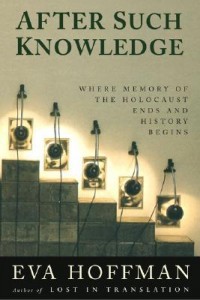From My Bookshelf: Fiction by Etgar Keret
Confession: I frequently read, admire, and link to Israeli author Etgar Keret’s nonfiction/essays (particularly his columns for Tablet), but I haven’t always been as comfortable with Keret’s fiction. I read The Nimrod Flipout when its U.S. publisher sent me a review copy of the English translation several years back (2006), and although I understood what the fuss was about–Keret is one prodigiously talented, not to mention prolific writer–my own reading tastes just don’t hunger for the sheer strangeness–call it experimentalism, fabulism, magical realism, whatever–that seemed to characterize the collection.
 Moreover, back then–around the time of the Second Lebanon War–my nascent interest in attempting to understand contemporary Israel through its literature was intensifying. There was so much about Israel that I, a Diaspora Jew, needed to learn (this remains all too true six years later). Keret’s fables and flash fictions didn’t seem to engage with the seriousness of what the Israelis call hamatzav— “the situation,” namely, the pervasive conflict that suffuses life in their country. It occurred to me only hazily (if at all) that this was a selfish indulgence of my Diaspora self; living within “the situation,” Keret could certainly be excused from spending still more time with it in his fiction.
Moreover, back then–around the time of the Second Lebanon War–my nascent interest in attempting to understand contemporary Israel through its literature was intensifying. There was so much about Israel that I, a Diaspora Jew, needed to learn (this remains all too true six years later). Keret’s fables and flash fictions didn’t seem to engage with the seriousness of what the Israelis call hamatzav— “the situation,” namely, the pervasive conflict that suffuses life in their country. It occurred to me only hazily (if at all) that this was a selfish indulgence of my Diaspora self; living within “the situation,” Keret could certainly be excused from spending still more time with it in his fiction.
But last week, a review-essay on The Millions caught my eye. Titled “The Maturation of Etgar Keret” and written by Bezalel Stern, it captivated me. And it sent me hurrying to add two new volumes to my bookshelf: Suddenly, A Knock on the Door (Keret’s latest book to be released in English, with translations by Nathan Englander, Miriam Shlesinger, and Sondra Silverston) and Four Stories, a slim collection I’ll address in greater detail shortly. (more…)

